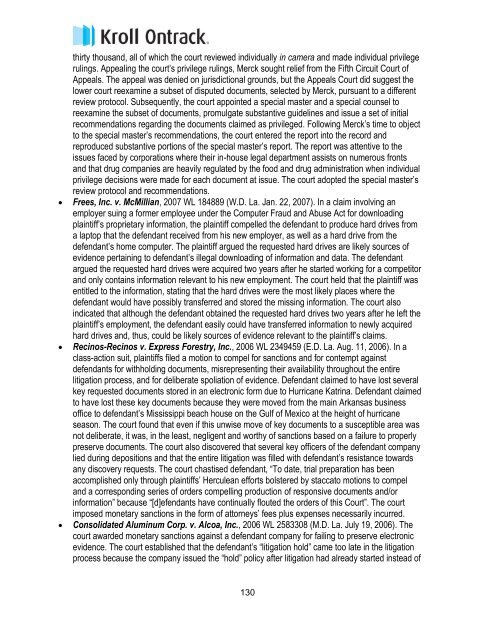Electronic Discovery and Computer Forensics Case List - Kroll Ontrack
Electronic Discovery and Computer Forensics Case List - Kroll Ontrack
Electronic Discovery and Computer Forensics Case List - Kroll Ontrack
You also want an ePaper? Increase the reach of your titles
YUMPU automatically turns print PDFs into web optimized ePapers that Google loves.
thirty thous<strong>and</strong>, all of which the court reviewed individually in camera <strong>and</strong> made individual privilege<br />
rulings. Appealing the court’s privilege rulings, Merck sought relief from the Fifth Circuit Court of<br />
Appeals. The appeal was denied on jurisdictional grounds, but the Appeals Court did suggest the<br />
lower court reexamine a subset of disputed documents, selected by Merck, pursuant to a different<br />
review protocol. Subsequently, the court appointed a special master <strong>and</strong> a special counsel to<br />
reexamine the subset of documents, promulgate substantive guidelines <strong>and</strong> issue a set of initial<br />
recommendations regarding the documents claimed as privileged. Following Merck’s time to object<br />
to the special master’s recommendations, the court entered the report into the record <strong>and</strong><br />
reproduced substantive portions of the special master’s report. The report was attentive to the<br />
issues faced by corporations where their in-house legal department assists on numerous fronts<br />
<strong>and</strong> that drug companies are heavily regulated by the food <strong>and</strong> drug administration when individual<br />
privilege decisions were made for each document at issue. The court adopted the special master’s<br />
review protocol <strong>and</strong> recommendations.<br />
� Frees, Inc. v. McMillian, 2007 WL 184889 (W.D. La. Jan. 22, 2007). In a claim involving an<br />
employer suing a former employee under the <strong>Computer</strong> Fraud <strong>and</strong> Abuse Act for downloading<br />
plaintiff’s proprietary information, the plaintiff compelled the defendant to produce hard drives from<br />
a laptop that the defendant received from his new employer, as well as a hard drive from the<br />
defendant’s home computer. The plaintiff argued the requested hard drives are likely sources of<br />
evidence pertaining to defendant’s illegal downloading of information <strong>and</strong> data. The defendant<br />
argued the requested hard drives were acquired two years after he started working for a competitor<br />
<strong>and</strong> only contains information relevant to his new employment. The court held that the plaintiff was<br />
entitled to the information, stating that the hard drives were the most likely places where the<br />
defendant would have possibly transferred <strong>and</strong> stored the missing information. The court also<br />
indicated that although the defendant obtained the requested hard drives two years after he left the<br />
plaintiff’s employment, the defendant easily could have transferred information to newly acquired<br />
hard drives <strong>and</strong>, thus, could be likely sources of evidence relevant to the plaintiff’s claims.<br />
� Recinos-Recinos v. Express Forestry, Inc., 2006 WL 2349459 (E.D. La. Aug. 11, 2006). In a<br />
class-action suit, plaintiffs filed a motion to compel for sanctions <strong>and</strong> for contempt against<br />
defendants for withholding documents, misrepresenting their availability throughout the entire<br />
litigation process, <strong>and</strong> for deliberate spoliation of evidence. Defendant claimed to have lost several<br />
key requested documents stored in an electronic form due to Hurricane Katrina. Defendant claimed<br />
to have lost these key documents because they were moved from the main Arkansas business<br />
office to defendant’s Mississippi beach house on the Gulf of Mexico at the height of hurricane<br />
season. The court found that even if this unwise move of key documents to a susceptible area was<br />
not deliberate, it was, in the least, negligent <strong>and</strong> worthy of sanctions based on a failure to properly<br />
preserve documents. The court also discovered that several key officers of the defendant company<br />
lied during depositions <strong>and</strong> that the entire litigation was filled with defendant’s resistance towards<br />
any discovery requests. The court chastised defendant, “To date, trial preparation has been<br />
accomplished only through plaintiffs’ Herculean efforts bolstered by staccato motions to compel<br />
<strong>and</strong> a corresponding series of orders compelling production of responsive documents <strong>and</strong>/or<br />
information” because “[d]efendants have continually flouted the orders of this Court”. The court<br />
imposed monetary sanctions in the form of attorneys’ fees plus expenses necessarily incurred.<br />
� Consolidated Aluminum Corp. v. Alcoa, Inc., 2006 WL 2583308 (M.D. La. July 19, 2006). The<br />
court awarded monetary sanctions against a defendant company for failing to preserve electronic<br />
evidence. The court established that the defendant’s “litigation hold” came too late in the litigation<br />
process because the company issued the “hold” policy after litigation had already started instead of<br />
130

















